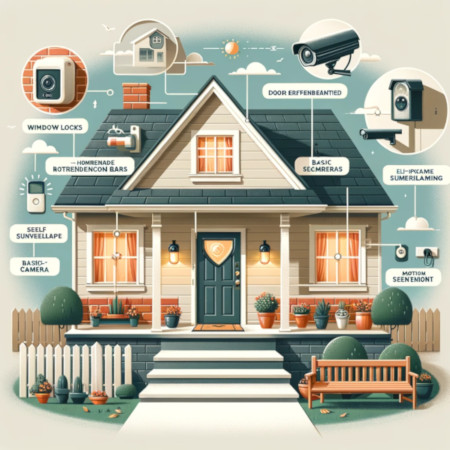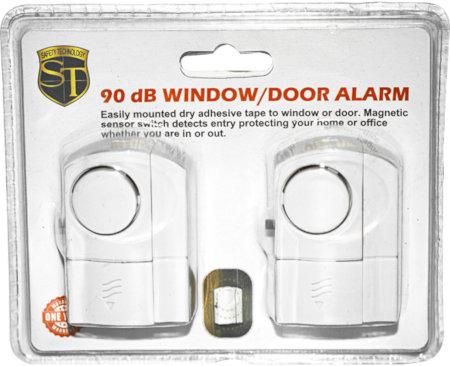Tips for Securing a Home on a Budget

In a world where safety has become an invaluable asset, protecting your home shouldn't be a privilege limited by price tags. If you've been hesitant about setting up home safety measures due to budget restraints, this article is here to change the game for you. Learn how to secure your haven from unwelcome intruders using cost-effective material and ingenious tactics. Welcome aboard a DIY journey designed for every homeowner who values security without breaking the bank - because peace of mind should be affordable!
Our comprehensive article on securing a home on a budget offers a range of cost-effective strategies to enhance your home's security. From reinforcing doors and windows, adding outdoor lighting, and utilizing home automation, to installing security cameras and using a fire-resistant safe, these tips will help deter potential burglars and provide peace of mind without breaking the bank. Taking proactive measures early to secure your home is crucial, as burglars strike every 30 seconds.
Low-Cost Door and Window Security
Securing your home on a budget can seem like an intimidating task, but there are easy, budget-friendly ways to enhance the safety of your house. In this section, we'll cover two important aspects: low-cost door and window security.
Firstly, let's address doors. Reinforcing your doors is crucial to keeping unwanted visitors out of your home; unfortunately, it can also be costly. However, you don't have to break the bank to keep yourself safe. Installing affordable door locks is an excellent solution.
Installing Affordable Door Locks
When it comes to door locks, not all are created equal. Basic doorknob locks are easily bypassed by most burglars. An effective option for low-cost protection against forced entry includes key-operated levers that mount on the inside of the door. These products require little effort to install and offer strength in numbers since they come in sets of two or more.
Another option is upgrading the deadbolt, which can be surprisingly effective and tremendously economical if done right. A simple replacement from a hardware store will cost less than $20 but presents a solid reinforcement. Simple things such as lengthening hinge screws with longer ones that penetrate into the door frame can also greatly improve resistance to forced entry.
Another affordable option often overlooked includes door jammer bars hinged at one end and fitted under the doorknob with a hook or leg stretching back towards the wall or floor. These function as an extended hand for stronger leverage when someone tries to force their way in.
As a college student on a budget, Sarah understood that her apartment might not be safe from intruders. After researching online, she found affordable door locks that would help reinforce her front door without spending too much money. She chose key-operated levers for easy installation purposes and added a durable deadbolt lock for under $20 from her local hardware store. After successfully installing and testing them, she slept soundly at night, knowing that her apartment was secure.
Now that we've tackled the importance of low-cost door security let's go over budget-friendly options for window alarms.
- A report by the FBI stated that burglaries accounted for around 17.1% of all property crimes in the US in 2019.
- According to SafeWise.com, approximately 60% of convicted burglars noted that a presence of security system influenced their decision to target another home.
- According to research conducted by the University of North Carolina at Charlotte's Department of Criminal Justice and Criminology, it's estimated that 34% of burglars enter through the front door, emphasizing the importance of securing this entry point.
Budget-Friendly Window Alarms
Windows represent the single most vulnerable part of any household. They are an easy DIY entry point for intruders and burglars, making window alarms a must-have deterrent. However, most of these systems can be costly and beyond the reach of everyone's budget. Fortunately, some wallet-friendly options won't break your bank while still keep you and your loved ones safe.
One option for budget-friendly window alarms is installing wireless magnetic sensors that trigger an alarm when activated. These inexpensive devices come in handy because they don't require extensive installation knowledge or connections to expensive surveillance systems. All it needs is a simple attachment to your windows, either through tape or glue.
A popular product in this category is the Safety Technology Personal Security Window/Door Alarm Kit that includes two alarms and battery replacements in one pack. It's affordable while providing necessary security features, such as a 90-decibel alarm sound.
The second option for budget-friendly home protection involves utilizing DIY security cameras and surveillance systems.
- In 2023, window alarms are considered a crucial deterrent against intruders and burglars. However, many of these systems can be expensive. For those on a budget, there are wallet-friendly options available that still provide adequate security. One such option is wireless magnetic sensors that trigger an alarm when activated. These devices are inexpensive and easy to install, requiring only a simple attachment to windows. The Safety Technology Personal Security Window/Door Alarm Kit is a popular choice in this category, offering affordability and essential features like a 90-decibel alarm sound. Another budget-friendly option is DIY security cameras and surveillance systems for home protection.
Affordable Surveillance Solutions
Not long ago, advanced security camera systems would have cost thousands of dollars, making them almost out of reach for homeowners on a tight budget. Luckily for us all, there now exists various affordable surveillance solutions created with modern technology innovations and consumer needs in mind.
One such solution involves using wireless internet-connected cameras that stream footage directly to your mobile devices such as smartphones or laptops. This surveillance-in-the-palm-of-your-hand offers the convenience of monitoring your home remotely and helps you avoid spending unnecessary funds on complicated surveillance hardware installations.
Leading companies like Ring and Wyze offer excellent, cost-effective wireless camera options with comprehensive features such as 1080p HD video quality, infrared night vision, audio capture, two-way communication, and motion detection alerts straight to your phone. In addition, these companies also provide additional storage options with cloud subscriptions.
Choosing Cost-Effective Surveillance Cameras
Installing surveillance cameras is one of the most effective ways to enhance home security. However, access to round-the-clock monitoring services or expensive systems can be beyond the budget for many homeowners. Luckily, there are numerous cost-effective and high-quality surveillance camera options available in the market today.
When choosing a surveillance camera on a budget, it's important not to compromise on quality. A few key points to consider include:
- Wireless Cameras: Wireless surveillance cameras work without wires and are easier to install than wired ones. They use Wi-Fi technology that directly connects to your internet network. Keep in mind that the strength of your Wi-Fi signal will affect the quality of the recording.
- Field of View: The field of view determines how much area a camera can cover. It's important to identify which areas you want to be surveilled and choose cameras with enough coverage.
- Night Vision: A camera capable of capturing clear footage even in low-light conditions is preferable when securing your home.
- Storage Capacity: Most security cameras have an onboard storage capacity to save video recordings. Ensure you get a device with enough storage capacity, as this could determine how long you can keep the footage before overwriting it.
It's also important not to forget other factors such as durability, image quality, and smart features like mobile notifications when motion is detected.
With companies like Wyze or Blink, you can find quality security cameras within an affordable price range - typically between $20-$100 prices per unit depending on specifications.
Aside from these considerations, it's crucial to research the legality surrounding recording devices within your local jurisdiction. This includes checking relevant laws around video and audio recording unless you want legal troubles due to non-compliance.
Security Through Landscaping and Lighting
Lighting up your yard and adding landscaping may seem like minor improvements; however, they can add an extra layer of security to your home. By designing your exterior to be less vulnerable to intrusions, you deter potential criminals and keep your home safe on a budget.
Start by marking exterior boundaries, like creating pathways and entrances to direct visitors to the front door rather than having them roam aimlessly around the property. This also helps identify when someone is wandering onto your premises who shouldn't be there.
Install motion-sensor lights in dark areas like the backdoor or garage for increased visibility at night. It’s worth noting that automated lighting systems can help create an illusion of activity within a room by systematically turning on/off lights. This works especially effectively when you are away but wish to discourage burglars from targeting your house.
Think of these deterrent tactics like the bark of a dog - while they may not provide complete protection from burglary, they signal to potential intruders that the homeowners have taken measures to secure their property, making them less appealing targets.
Another key strategy involves using plants and architecture to obscure points of entry into your home. Tall bushes obscured windows, shaded entryways, and hidden doors offer nocturnal criminals an opportunity to break into a home without being seen by neighbors or pedestrians.
By implementing these simple techniques in tandem with dependable surveillance camera systems, you can strengthen your home's safety without breaking the bank.
Deterrents in Garden Design
As the saying goes, prevention is better than cure. One of the best ways to ward off burglars from your home is by increasing the natural barriers - specifically, deterrents in garden design.
Adopting landscaping practices that create a clear line of sight and remove obstructions near windows and doors can be an excellent strategy. Avoid overgrown shrubs and trees that provide cover which burglars can use. Additionally, planting thorny bushes or prickly barriers below windows may deter an intruder.
There are also many DIY tricks that you can implement without spending a penny - such as adding used coffee grounds or fireplace ashes to soil around plants at risk of being tampered with, creating a smell that repels animals like rabbits.
To help get started with deterrents in garden design, here are some simple steps you can take to improve your yard's safety:
| Step | Description |
|---|---|
| 1 | Trim down trees and plants close to your home |
| 2 | Plant thorny or prickly bushes under windows |
| 3 | Remove overgrown shrubs and trees obstructing entrances and exits |
| 4 | Add reflective film on windows to obscure outsiders' view |
| 5 | Place outdoor lighting strategically for convenient usage |
When it comes to securing your home on a budget, bad security often means not having any plan at all. By implementing garden design deterrents, you signal to potential burglars that they're not welcome near your property.
Economical Outdoor Lighting Options
Dimly lit areas around homes appeal more to burglars than those with suitable lighting, regardless of the time of day. Suppose you're looking for effective, economical outdoor lighting options to secure your home. In that case, you're in luck! There are various DIY hacks to boost safety outdoors.
String lights have gained popularity in recent years and serve the dual purpose of being aesthetically pleasing and a practical source of light. Installation is straightforward, with numerous YouTube tutorials for guidance, and they can be purchased at relatively low costs, too. Additionally, motion-sensor lights have become popular in recent years as well, providing cost-effective illumination that only activates when someone walks past.
Good outdoor lighting doesn't need to be fancy or complicated; regular flashlights can do the trick. For instance, solar-powered LED path lights are affordable, energy-efficient, and enough to keep entryways lit without breaking the bank. Some models even come equipped with motion sensors, but keep durability in mind since cheaper brands may malfunction quickly or struggle during inclement weather.
Consider these economical outdoor lighting options for your home:
| Option | Description |
|---|---|
| 1 | Solar path lighting |
| 2 | Motion-sen LED porch light |
| 3 | DIY string lights |
| 4 | Infrared motion detector lights |
While adequate lighting in itself cannot entirely prevent incidents from occurring, it's an effective deterrent. It makes it easy to identify potentially risky situations and provides critical visual support to nearby security cameras if required.
Good outdoor lighting is like your home's immune system - warding off potential intrusions and signaling to thieves that their activities will be observed.
Safekeeping Valuables Without Costly Safes
Valuables often play a significant role in the lives of many people. They could be possessions that hold sentimental value, like family heirlooms and jewelry passed down from generations. Other valuable items may be high-end electronics, expensive watches, or collectibles with significant financial worth, like art pieces or rare coins. Protecting your valuable belongings without breaking the bank can seem like a herculean task. However, it is possible to keep them safe without purchasing costly safes.
One of the easiest and most straightforward methods is hiding valuables in places that burglars wouldn't suspect, such as inside old books or hollowed-out candles. Consider pulling apart an old telephone jack outlet behind couches and cabinets to make super-secret hiding compartments for small items like cash or jewelry.
Another effective method to protect your valuables is to create diversions. Using objects that grab attention but have no real substance can mislead burglars into thinking these are your actual valuables.
Finally, consider storing valuables outside the home in storage lockers or renting space in a safety deposit box at your local bank. While this option may incur fees, it's a reliable method that offers added peace of mind.
Let's now explore cost-free measures to deter criminal activity.
Cost-Free Measures to Deter Criminal Activity
Home security does not always mean having to spend big bucks. Here are some DIY measures you can take at minimal cost:

Firstly, aim for ample outdoor lighting by installing motion-sensitive floodlights and trimming down trees and plants around high-traffic areas as they can serve as hiding places for burglars.
Secondly, reinforce glass windows with security films that prevent easy entry from shattered windows and strengthen key areas such as entry points with aftermarket window locks. Use curtains or blinds to shield high-value items from peering eyes.
Thirdly, fortify entrances and exits by replacing standard screws with longer ones for deadbolts and strike plates for your doors, as these can be kicked open quickly otherwise.
Fourthly, keep all doors to your garage locked at all times, including interior and exterior ones. Never leave your garage door opener in the car; always lock the entry door from your house to your garage.
Fifthly, install a reliable security system with motion detectors and night vision cameras. Remote monitoring should be an option that most modern systems offer, along with professional home security services.
Lastly, consider getting to know neighbors in your area and forming a group text or email chain to alert everyone of any suspicious activity in the area. It is always better to be vigilant rather than complacent when it comes to keeping your home secure.
To put things into perspective, imagine having plans for the weekend, and you're not going to be home. Alerting your neighbors of this can also make them more aware of their surroundings as well as keep an eye on any suspicious activity around your property.
Think of creating layers of protection around your home like protecting an onion. The more layers you add, the more challenging it becomes for burglars to get inside.
Remember – burglary happens every 30 seconds! Homeowners need to take proactive measures continually to ensure the safety of their homes, themselves, and their valuables.
Add your comment now!
Post Comment




